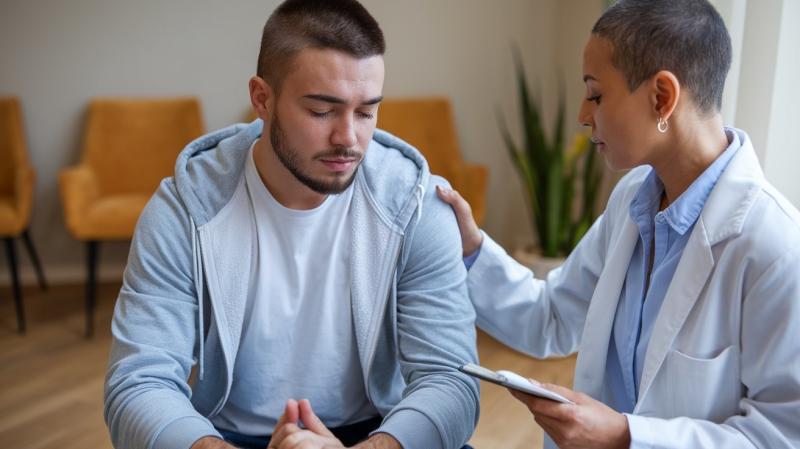The Dangers of Having an Untreated Substance Use Disorder

Learn about the risks of untreated substance use disorders and why early intervention is crucial. Find help for recovery at Virtue Recovery Center.

Substance use disorders affect millions of people, yet many don’t realize the full dangers of leaving addiction untreated. When substance use goes unchecked, the risks increase for health, emotional well-being, finances, and personal safety. These risks don't just impact the individual struggling but often affect their loved ones and community as well.
By understanding the potential consequences of untreated substance use disorders, individuals and families can see why early intervention is crucial. Let’s explore the risks of leaving substance use disorder untreated and how seeking help can change the course of one’s life for the better.
Physical Health Risks of Untreated Substance Use
Untreated substance use disorders take a heavy toll on the body. Over time, continuous use of substances like alcohol, opioids, stimulants, and other drugs can harm significant organs such as the heart, liver, and kidneys. The immune system weakens, making the body more vulnerable to infections and illness.
As tolerance builds, many individuals increase their substance use to feel the same effects, raising the risk of overdose—a life-threatening event that can happen without warning. Leaving substance use untreated not only shortens lifespan but also compromises daily quality of life.
Impact on Mental Health and Emotional Well-Being
Substance use doesn’t just affect the body; it also impacts the mind. People struggling with substance use often experience heightened mental health challenges, such as anxiety, depression, or mood swings. These mental health conditions frequently fuel the addiction cycle, leading to further substance use as a form of coping.
Without treatment, feelings of hopelessness and emotional instability can worsen. Substance use may temporarily mask painful emotions, but in the long run, it often leads to deeper struggles. Seeking help for both addiction and mental health offers a path to healing and emotional balance.
Social and Relationship Consequences
Substance use disorders can isolate individuals from those who care about them most. Friends and family often struggle to maintain relationships when addiction is present, leading to strained dynamics, broken trust, and lost friendships. Behaviors like lying or missing commitments can drive loved ones away
Without treatment, addiction can consume the time and energy needed to build healthy relationships. Professional support provides tools to rebuild connections and helps individuals form healthier social bonds that support their recovery.
Financial and Legal Challenges
Substance use disorders can have significant financial consequences. As addiction deepens, individuals may struggle to maintain employment or face mounting debts. Funding a substance use habit may divert money from basic needs like housing, food, and transportation.
Legal troubles are another risk when addiction goes untreated. Certain substances or behaviors under the influence can lead to risky or illegal actions. Treatment offers a chance to regain financial stability and avoid legal pitfalls by breaking free from these patterns.
Safety Concerns and Increased Risk of Accidents
Safety becomes a major concern when substance use goes untreated. Impaired judgment, slower reaction times, and risky behaviors can lead to car crashes, falls, and injuries, endangering the individual and others.
Untreated substance use increases the likelihood of these dangerous situations. Treatment provides a way to regain control, improve personal safety, and make safer choices to protect the individual and their community.
Benefits of Early Treatment for Substance Use Disorder
Seeking help early can make a life-changing difference for someone struggling with addiction. Early intervention provides tools and support to break the cycle before it progresses further. Professional treatment teaches individuals healthier coping strategies and skills to resist triggers.
Treatment improves physical and mental health, strengthens relationships, enhances self-esteem, and restores purpose. At Virtue Recovery Center, we provide compassionate care to help individuals find the path to recovery and a healthier, more fulfilling life.
Conclusion
The risks of untreated substance use disorders extend across all areas of life, affecting physical health, mental well-being, relationships, finances, and personal safety. By seeking help early, individuals can avoid the worsening impact of addiction and take the first step toward a better future. If you or a loved one is ready to start the journey to recovery, contact Virtue Recovery Center at 725-777-5685. Our team is here to provide support, guidance, and hope.
FAQs
What are the physical dangers of untreated substance use?
Untreated substance use can lead to severe health issues, including heart disease, liver damage, and an increased risk of overdose—physical health declines over time, compromising quality of life.
How does untreated substance use affect mental health?
Untreated substance use can worsen mental health conditions, such as depression and anxiety, leading to emotional instability and a reduced ability to cope with stress.
Can addiction lead to financial problems?
Yes, untreated addiction often results in financial strain due to job loss, debt, and even legal fees, as the individual’s focus shifts away from responsible financial habits.
Resources:
https://nida.nih.gov/publications/drugs-brains-behavior-science-addiction/drug-misuse-addiction
https://www.samhsa.gov/mental-health/mental-health-substance-use-co-occurring-disorders

Comments